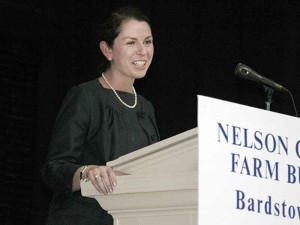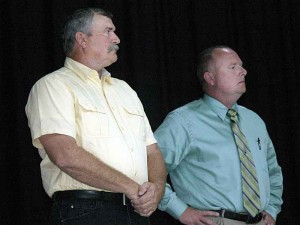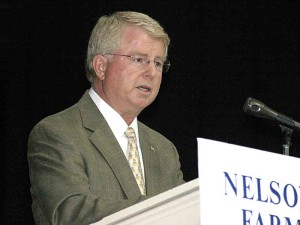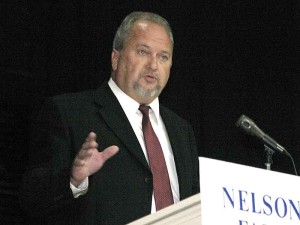NCFB Forum: State rep., judge executive & sheriff candidates square-off
By JIM BROOKS
Nelson County Gazette / WBRT Radio
Wednesday, Oct. 1, 2014, 2 a.m. — Candidates for state representative, judge executive and sheriff squared off Tuesday night at the candidate forum sponsored by the Nelson County Farm Bureau.
Each set of candidates were each asked to respond to questions posed by member of the Nelson County Farm Bureau board of directors. Most of the questions focused on issues important to farms and agribusiness.

Audrey Haydon answers a question during the Farm Burea candidate forum Tuesday night at the Nelson County Civic Center.
50TH DISTRICT STATE REP. Incumbent state Rep. David Floyd and Democratic challenger Audrey Haydon both voiced support for the state’s existing fence law. The law requires neighbors to share the cost of fencing that separates their property.
After hearing concerns about the fence law some years ago, Floyd said he worked on a bill that would allow some flexibility, particularly in a case of financial hardship. When the Kentucky Farm Bureau backed away from supporting the measure, he dropped the bill too, he said.
On a question related to eminent domain, both Haydon and Floyd said they support clarifying existing state law to prevent a private company like the Bluegrass Pipeline from using it to obtain easements. Floyd noted he was part of a bipartisan effort that successfully got a bill to do that through the state House, though that bill died in the Senate.
The candidates differed mostly on a question related to tort reform.
Haydon noted that only 4.4 percent of lawsuits are personal injury cases, and tort reform would not affect the majority of lawsuits in the court system. She would not support tort reform as she believes in an individual’s right to have their day in court, she said.
Floyd said he was in favor of tort reform, citing the increased liability insurance costs that Kentucky nursing homes must pay. He supported legislation that would have created an independent board of review for nursing home lawsuits, which would have offered a finding the claims in a nursing home lawsuit. The review would not prevent the lawsuits from proceeding in the court system.
While each spoke in favor of reforming the state tax code, the candidates had differing points of view.
Haydon said she was in favor of reforming the tax system to close loopholes that allowed corporations to avoid paying their share of taxes.
The term “tax reform” in political speak usually translates into “higher taxes,” Floyd told the crowd, citing Gov. Beshear’s blue ribbon tax reform panel led by Lt. Gov. Jerry Abramson that offered suggestions that included taxing sales of items and services that are currently not taxed.
Floyd said he was in favor of true tax reform that would improve Kentucky’s ability to compete to win business and industry.
Both candidates said they would oppose reducing funding the Ag Development Board receives from the Master Settlement Agreement. Haydon noted the money is vital to Kentucky farmers who seek to diversify their operations.
Both candidates also said they supported the provisions of House Bill 44, the state law that limits tax increases to a 4 percent increase in tax revenue. Both also were in favor of continued funding of the state’s Rural & Secondary Road Fund, which Floyd noted had helped pay for recent county projects.

Judge Executive Dean Watts holds the “help wanted” ads from the local newspaper to illustrate the local economy’s momentum.
NELSON COUNTY JUDGE EXECUTIVE. Incumbent Democrat Dean Watts and independent Tim Hutchins faced off without their Republican opponent, Pete Trzop. In a press release last week, Trzop said he refused to participate in candidate forums with Hutchins, who he said was “an illegitimate candidate” due to questions about the signatures on his nominating petition.
In a series of friendly but pointed exchanges, Watts and Hutchins made it clear why each believed he was the best candidate for judge executive.
A question about an indoor aquatic center — an issue in the judge executive race four years ago — revealed both candidates’ support for such a facility.
If elected, Hutchins said he would play a leadership role in making the indoor pool a reality. He cited his role in fundraising for his church as an example of his ability to pull people together and get things done. The aquatic center should be funded by a consortium of private and public interests — and without the YMCA’s involvement.
Watts said raising the money to build an aquatic center really isn’t the issue. “Sustainability is the issue,” Watts said, noting that the operation of the Lebanon aquatic center loses about $250,000 a year.
Watts said he has met with private investors, and is confident that an aquatic center will eventually happen.
The candidates differed on their responses to a question about the county’s dead animal removal service.
The service is offered as a free service to farmers — a practice that Hutchins said leads to abuse of the service by corporate farm operations. “Some of them have pick ups two, three times a week or more,” he said. “There should be limits on how much we should do for free.”
Watts noted the program is funded partly by county garbage bills. It keeps dead animals from being a hazard or nuisance, he said, adding that as judge executive he will keep the program operating the same as it has.
Both men also supported the idea of a western bypass to connect Boston Road to KY 245. Watts said funding has been approved for a scoping study to examine the feasibility of the bypass. If elected, Watts said he’ll continue to pursue its construction.
Hutchins said Nelson County has fallen behind other counties in road and highway projects. “Nelson County has been left out,” he said. “Partisan politics can get in the way.”
On the question of the growing need for water in the county, both candidates agreed in a need for long-range planning.
The Northeast Nelson Water District uses water from the Louisville Water Company, and Hutchins said Louisville would be his choice for a future water supplier.
Watts said that Louisville water could be an option, but that the City of Bardstown isn’t interested in such a move. The two water suppliers use incompatible treatment processes.
Both candidates also agreed the county recycling program should be expanded.
Curbside recycling is available for residents in housing developments outside the city limits, Watts explained. Only about 10 percent of households who have it available use the service, he said.
“I’m in favor of countywide recycling if we can make it work financially,” he said.
Hutchins said as judge executive, he would push to make countywide recycling a reality.
In his closing remarks, Hutchins said as judge executive he would push to simplify planning and zoning. The county inspection program is a burden for farmers, and he would like to see that change too, he said. Hutchins was critical of Watts’ record on bringing new jobs to the county, citing the economic development successes neighboring counties.

Republican J.T. “Thomas” Fulkerson, left, and Ed Mattingly stand as they prepare for Tuesday night’s candidate forum sponsored by the Nelson County Farm Bureau.
Watts unfolded the “help wanted” ads from the local newspaper and showed it to the crowd, saying that he judges the local employment situation by the number of jobs published each Sunday. Leadership as judge executive “is not about ‘us,’ not about ‘I,’ its about building consensus,” he said.
NELSON COUNTY SHERIFF. Democrat Ed Mattingly and Republican J.T. Thomas Fulkerson are both seeking the open seat for Nelson County Sheriff when Sheriff Steve Campbell announced he would not seek re-election.
Mattingly said as sheriff he would improve policing and investigations conducted by the sheriff’s office. He said he understood the sheriff’s office roles to collect taxes, provide court security and serve papers, but improving policing effectiveness “is a quality of life issue.”
Fulkerson told the Farm Bureau crowd as sheriff, he would work to rebuild the trust between the sheriff’s office and the public. He would have deputies serve more papers as a way of helping get deputies out in the public eye.
In response to a question about neighborhood watch programs, Fulkerson cited the need to rebuild trust and respect for the sheriff’s office, which would be helpful in getting participation in community watch programs.
Mattingly said social media is changing the way police interact with the public. The community has helped solve crimes with information via social media, he said. “Today, the whole county is your neighborhood.”
The candidates disagreed on a question about assigning deputies to operate in certain areas of the county.
Mattingly said the idea has worked well in the city but not in the county due to the larger area deputies must serve. Traveling from the Nelson-Anderson County line to the Howardstown area can take as long as 45 minutes travel time, he said. With more deputies it would be feasible to have deputies working in specific areas.
Fulkerson said he it is possible to make assigned areas work now with the existing number of deputies. “It does work and it will work,” he said. “I know, I’ve lived it.”
Fulkerson said funding a larger department might be possible if the sheriff’s office served more court papers, which brings in revenue. Mattingly said he would like to see all of the deputies who work court security have cars so they can be available for other assignments if they aren’t needed in court.
In a question regarding gang activity, Fulkerson said the issue comes down to police having respect for the public and earning the public’s trust. We can’t keep gangs out of the county, but police need to improve relationships with the public to help counter the threat gangs pose.
“We like to think we don’t have gangs,” Mattingly told the audience. “You’ve heard of the Bardstown Money Gang? They are here and they are active.”
Gangs are a bigger social problem than one sheriff can solve, Mattingly said. Gangs are still here and still expanding, and it will take good, strong policing to deal with them.
In closing, Fulkerson said favoritism and double standards have created an inefficient sheriff’s office. “I intend to change that,” he said.
Mattingly said police collect a lot of data about the work they do, but too often nothing is done with the information. “I promise to act on it and be the best sheriff Nelson County ever had.”
-30-







